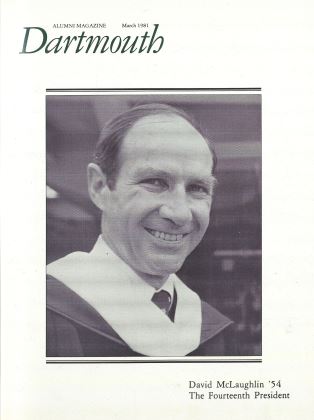An agreement has finally been reached between the College and the Hanover Review Inc., publisher of the weekly Dartmouth Review, over the use of the word "Dartmouth" in the newspaper's title. A long and sometimes antagonistic legal argument began last fall when the new student-run paper rejected the College's demand that it publish under some other name. Because of the paper's outspoken criticism of officers and policies of the administration, some students and alumni interpreted the College's threat of legal action as vindictive. College officials have maintained, however, that their only concern has been protection of the name Dartmouth from certain kinds of unsanctioned commercial use.
"We don't disagree with a bank or sporting goods store using the name because we don't engage in those business activities," College counsel Cary P. Clark '62 said recently. "We disagreed with the Review because its subject matter deals with the College." In mid-January, in a letter to the Hanover Review's attorney K. William Clauson, Clark announced the College's decision to grant a conditional, one-year, non-exclusive license to use of the name Dartmouth by the publication. The agreement stipulates that the paper conspicuously advertise its non-affiliation with the College and that it remain studentcontrolled. The license does not extend to use of College mailing lists or other resources.
Meanwhile, two of the paper's founders, seniors Gregory A. Fossedal and Benjamin J. Hart, organized a challenge to the Alumni Council's nominees for two forthcoming vacancies on the Board of Trustees. Opposing the council's selection of Ronald B. Schram '64 and Robert E. Field '43, Fossedal and Hart and others have been gathering signatures to nominate Malcolm V. Beard Jr. '67 and T. Coleman Andrews 111 '76 by petition. If the required 250 signatures are obtained by March 1, a ballot will be sent to all alumni in a replay of last year's contest that resulted in the selection of John F. Steel '54 over the council's candidate Raymond J. Rasenberger '49.
The principal issue this time is the set of guidelines governing the nominating and balloting process. They were adopted last November by the executive committee of the Association of Alumni in an attempt to avoid the procedural problems that developed with the Steel-Rasenberger contest. S. Avery Raube '30, one of the organizers of the Steel candidacy, has objected in particular to the ban on organized or funded campaigns. Clauson, who served as Steel's attorney, acknowledged recently that Raube asked him for "an attorney's opinion" about the wisdom, fairness, and constitutional legitimacy of the guidelines. In spite of speculation by friends and foes of the guidelines that a legal battle may be in the works, Clauson said he had not discussed litigation with Raube and that his client's concern was to head off future problems with"some pretty bad rules."
Legal action was announced, however, by Scott Baker '81 this time against the ALUMNI MAGAZINE. In a recent letter in the Dartmouth Review, Baker declared his intention to sue the magazine for "censoring advertisements concerning the Indian symbol." Baker's original advertisement advocating a return of the Indian symbol has been accepted for publication. It was Baker's later revision, offering "Indian head posters, T-shirts, sweat-shirts, and jackets" for sale, that was rejected in accordance with a policy of declining advertising that exploits the Indian symbol for commercial purposes.
" 'MANY alumni don't know what's going on at the College,' [Biology Professor Thomas Roos said].Roos blamed the problem on a lack of content in the DARTMOUTH ALUMNI MAGAZINE, which, he said, 'emphasizes athletics and gossip.' " The Dartmouth, February 17 "I am sufficiently distressed by ... the DARTMOUTH ALUMNI MAGAZINE . . . that I will initiate a legal suit against the publication." Scott Baker '81
 View Full Issue
View Full Issue
More From This Issue
-
 Feature
FeatureConjuring Ethics in the Curriculum at Dartmouth
March 1981 By Dan Nelson -
 Feature
FeatureRich and tasty cabinetwork
March 1981 By Shelby Grantham -
 Cover Story
Cover StoryThe Fourteenth President
March 1981 By M.B.R. -
 Article
ArticleImagining Beyond Limits
March 1981 By Don Rosenthal '81 -
 Class Notes
Class Notes1948
March 1981 By FRANCIS R. DRURY JR. -
 Class Notes
Class Notes1967
March 1981 By CLEMSON N. PAGE, JR.







